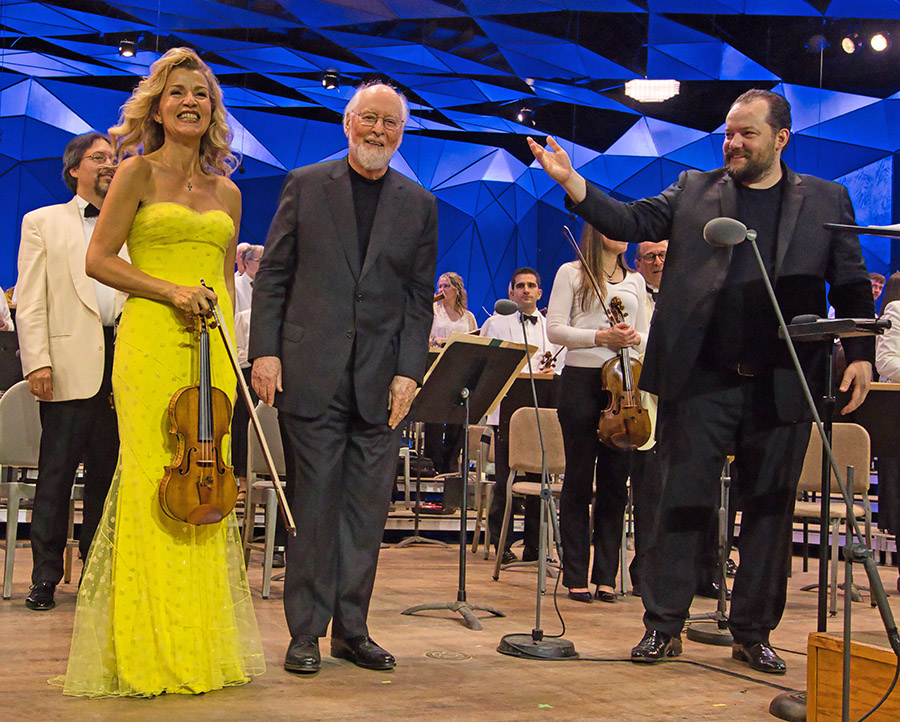
Anne-Sophie Mutter, Andris Nelsons, and John Williams, with Beethoven’s Overture, “The Consecration of the House,” John Williams’ Violin Concerto No. 2, and Bartók’s Concerto for Orchestra apotheosized opening night and re-consecrated the BSO house. Ending a 20-month audience absence, a nearly capacity masked, expectant crowd greeted the orchestra in a ringing welcome back last night.
Nelsons pulled the reins in early on Beethoven, finally loosening up on the fugal and final drives. Brilliance unrolled in the four-panel concerto with limitless virtuosic and orchestral encounters featuring Mutter in the starring role and Williams directing. Endlessly captivating to ear and eye, both violinist and composer revealed an intimately personal collaboration, surely a chartbuster. For their encore, a twist, a special arrangement of a 1972 Williams’ soundtrack. The BSO and Nelsons evinced memorable moments of charm, lyricism and fun, eschewing Bartók’s haunting world. The orchestra in top form did not disappoint in its surpassing artistry.
Nelsons led Beethoven’s The Consecration of the House Overture, the work which, in 1881, began the BSO’s long run. An unexpected smooth-edged announcement of the opening chords to the slow introduction would ultimately set the tone for the processional music. Brass fanfares overtook the rapid-fire bassoon duet allowing only a few last notes to come through. For most of the time, Nelsons overlooked the Overture’s potential for any real spunk.
This past August, Mutter and Williams with the BSO premiered Violin Concerto No. 2 at Tanglewood. This new work, another one for his friend, largely received positive yet wait-and-see-again reviews. For this first Boston performance a listener noted “music that has to fit to a storyline seems to suit Mr. Williams than music for which he has to make up the story himself.” Robert Kirzinger’s essay deferred to Williams, whose own words offered little comprehensive guidance.
The four movements, Prologue, Rounds, Dactyl, and Epilogue, rather than standing alone, formed a four-panel composition. In this semi-abstract continuum, Williams plumbed violin techniques for superstar Mutter in a starring role. The harp placed near the podium played an important but limited role throughout. Williams featured the timpani in a cameo role. As with the violin, the composer of well over a hundred film scores sounded the orchestra in an astounding array of compositional encounters.

The Concerto is a must-hear. It dazzles and emotes, making known the mind of a composer out of Hollywood writing concert music. It was at once beautifully bewildering and a masterfully crafted work.
An aside, CLASSIC fm digital radio listed some of Mutter’s favorite albums—Ella Fitzgerald and Korngold film tracks. Obviously, an update is in order.
Taking to the podium Williams pointed his baton to Mutter amid the audience’s joyful greeting and then waved to all with a sunny smile. After the performance he spoke of returning to this “magical place” and being with “one of the greatest instrumentalists on earth.” The encore, his own and only arrangement for orchestra and violin of his music for Robert Altman’s “The Long Goodbye,” invoked nostalgia all around.
Over three quarters of a century ago, while World War II still gripped the nation, Serge Koussivitzky commissioned and conducted the BSO in the premiere of Bartók’s Concerto for Orchestra at Symphony Hall. One of the premiere performances is posted on YouTube. This 2021 iteration under Andris Nelsons journeyed along cool and calculated routes, clarity being a priority. Some old-time fun from the bassoon and muted trumpet wizardry in the Game of Pairs movement spun away. Lilt from the oboe and other winds in the Interrupted Intermezzo breathed fresh air, the interruption with the lead clarinet and the brass glissandi mocked Shostakovich —all in good sport. Some promising suspense in the Finale, instead, wound up spotlighting BSO’s stellar sound.


